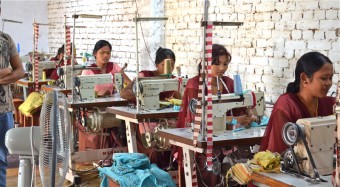
Moving beyond kamlari in Nepal
The Nepal Youth Foundation was our featured program in January 2012. Dining for Women funded the Indentured Daughters Program, which, with the official abolition of kamlari, has become the Empowering Freed Kamlaris program. We recently saw an inspiring television report on their success and asked for an inside look. This update on the organization’s efforts and the photos and success stories show the tremendous impact we can all have.
By Jacqueline Frost
Nepal Youth Foundation
An amazing transformation is happening in Nepal. Vulnerable girls who were rescued from the Kamlari system of child slavery are now free — and they’re becoming powerful young women who are leading the way to a better life for themselves and their communities.
In 2000, Nepal Youth Foundation launched a campaign to end the practice of Kamlari, a system of indentured servitude in which girls from desperately poor families are sold into domestic slavery.
Since then the foundation has rescued over 12,000 girls and returned them to their home communities.
But rescuing the girls from Kamlari isn’t enough. Every one of them has suffered traumatic loss and abuse during their childhood and they’ve been deprived of an education. They’ll need support well into their young adulthood in order to thrive and successfully make their place in the world.
The Nepal Youth Foundation’s Empowering Freed Kamlaris program (EFK) is helping the former Kamlari girls become healthy, happy and independent young women, and is stimulating the cultural and economic development necessary to ensure that no child will ever become a victim of Kamlari again.
- Leadership Training: Program staff provides training in leadership skills, organizational management, political literacy, accounting and financial literacy, and entrepreneurship and business management for the 1,375 young women who have created the Freed Kamlari Development Forum.
- Economic Development: There are now 37 of these business co-ops in Western Nepal with over 2,600 members. We have provided $45,000 to start the co-op loan fund, which FKDF members administer, and more than 635 young women have successfully launched their own businesses. Co-op members have already reinvested $40,000 back into the loan fund.
- Vocational Education and Career Counseling: Our staff provides structured counseling sessions and assessment tests, and then helps girls enroll in top-quality training programs for a wide variety of careers. 82 percent of graduates are currently employed — a remarkable achievement given that the unemployment rate in Nepal is 40-46 percent.
- Psychological Support: With training and supervision from the staff of our Ankur Counseling Center, freed kamlari peer counselors provide emotional support for former Kamlaris, along with a referral service for those who need more help. There are now 50 organized peer counselors and five assistant counselors conducting 145 monthly support groups with 2,025 participants.
- Total Served: The Empowering Former Kamlaris program will serve a total of 8,000 girls and young women this year.
- Staffing: 18 full-time staff provides mentoring and training services and coordinates the delivery of specialized services in conjunction with other Nepal Youth Foundation programs.
Freed Kamlari Business Co-op Success Stories
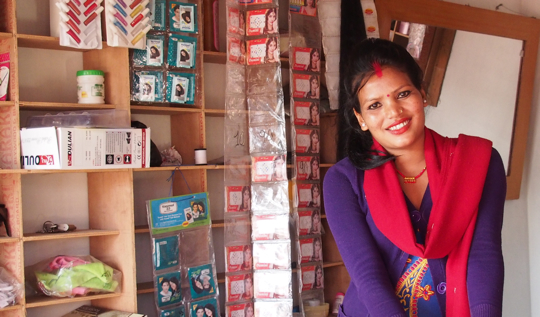
After Mina was rescued from Kamlari, she entered our special program to make up the schooling she had missed. She graduated high school and went on to beautician training in vocational school. Mina opened her own salon with a co-op loan, and now offers haircuts, facials and more — and earns up to 1,000 rupees a day. And she’s still in college, working towards a health degree.
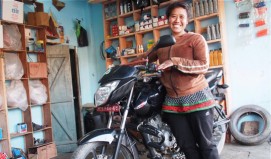
Kamala spent seven years as a Kamlari, working under terrible conditions. The foundation rescued her in 2004 and put her through school and vocational training — and now she may be the only female motorcycle mechanic in Nepal. With a loan from the co-op, Kamala started her business fixing motorcycles and selling parts. Her shop employs two men and Kamala is bringing in 5,000 rupees a day, which is good money in her area of Western Nepal.
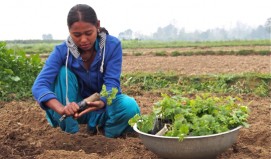
A Kamlari for five years before being rescued by Nepal Youth Foundation, Asmita now tills her own fields with her family by her side. “Before we had to work in other people’s houses,” she said. “Now we work our own land.” After high school, we sponsored Asmita in an agricultural training program, and then she started her farm with a co-op loan. She’s also trained 40 other former Kamlari in farming to help ensure their independence.
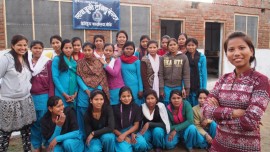
Currently the president of the forum chapter in the Banke District, Dilkumari spent six years of her childhood as a Kamlari. Dilkumari is a true entrepreneur. She used a co-op loan to establish a training center for tailoring and clothing design, and also manages a hostel where the students can stay during their training period. Dilkumari is proving to be a very successful businessperson.
